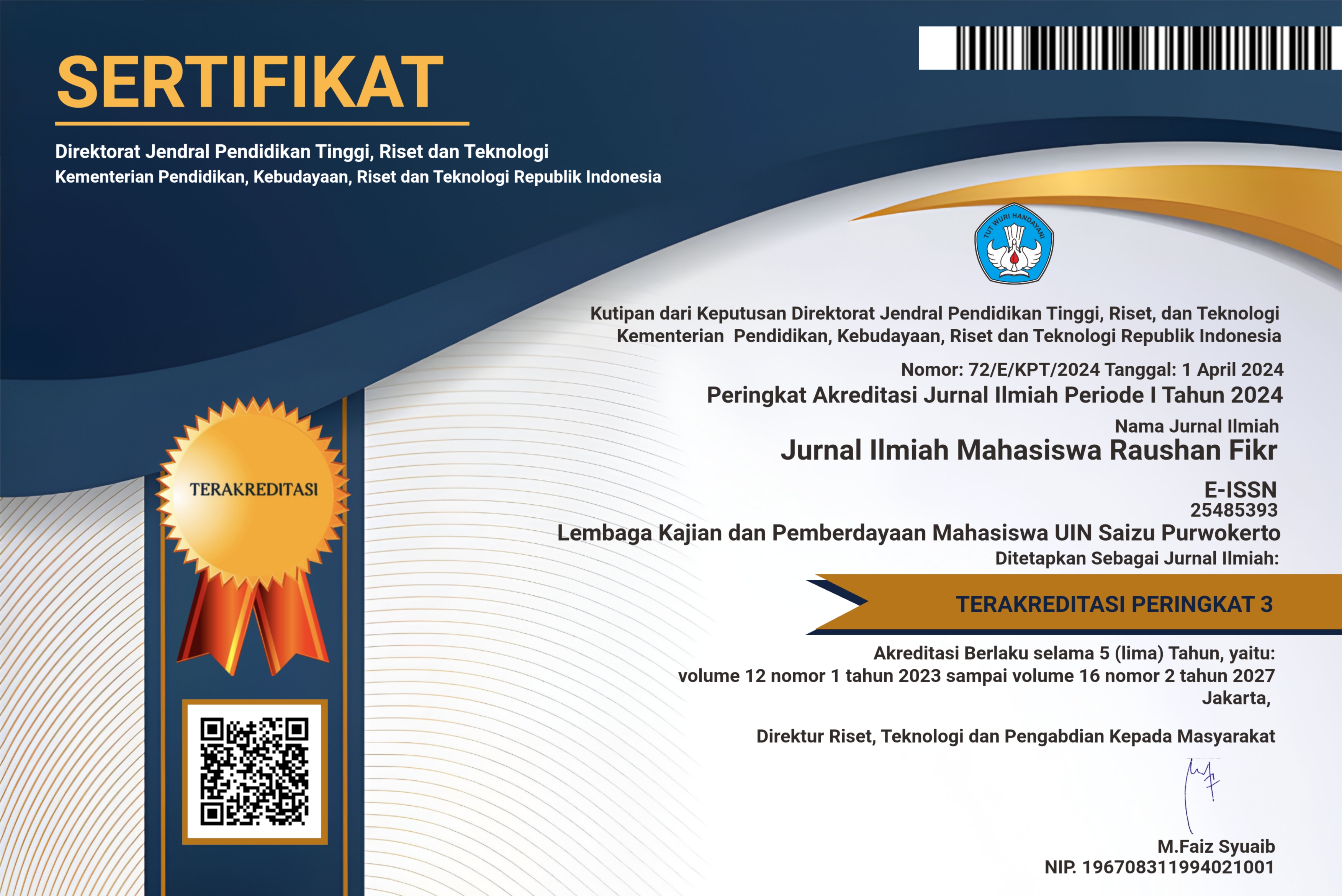Implementation of Maqasid Al-Syariah in Empowering the Zakah Community Development Program
DOI:
https://doi.org/10.24090/jimrf.v13i1.11291Keywords:
Zakat, Maqasid Syariah, ZCDAbstract
The study investigates the implementation of zakah as a strategy for community empowerment in Gunung Binjai village, Balikpapan city, via the Zakah Community Development (ZCD) system. Utilizing descriptive qualitative methods with a socio-economic approach, the research evaluates the system through maqasid al-syariah. Findings indicate that the ZCD system enhances the welfare of zakah recipients (mustahik) in line with maqasid al-syariah principles, particularly daruriyatul khams, which include protecting religion, life, intellect, progeny, and property. This system significantly improves mustahik socio-economic well-being, illustrating zakah’s role beyond charity as a tool for societal transformation. The study provides empirical evidence and a detailed analysis, highlighting the ZCD system as a model for effective community empowerment and demonstrating the compatibility of Islamic principles with contemporary socio-economic development. It advocates for a holistic approach rooted in maqasid al-syariah to achieve sustainable progress in marginalized communities.Downloads
References
Adams, R. (2003). Social Work and Empowerment (3rd ed.). Palgrave Macmillan.
Ahmad, A., Hairiel, B., Wan Chik, W., Mohd, M. H. S., DIAH, N., & Halim, A. (2020). Contextualising Maqāṣid al-Sharī’ah and STEM (Science, Technology, Engineering, and Mathematics) education in the era of the Industrial Revolution 4.0. Journal of Physics Conference Series, 1529, 42042. https://doi.org/10.1088/1742-6596/1529/4/042042
Al-Ghazali. (n.d.). Al-Mustasfa min CIlm al-Usul. Tahq. Al-Ashqar, Muhammad Sulayman. Al-Risala.
Anantyasari, M., Suwarno, A., Nashirudin, M., Mu’awanah, C., & Asri, N. (2022). Relevance Of Islamic Banking In Indonesia To The Muamalah System Of The Prophet And The Caliph. Journal of Islamic Economic Laws, 5, 297–322. https://doi.org/10.23917/jisel.v5i2.17657
Awang, S. (2017). The Concept of Charity in Islam: An Analysis on the Verses of the Quran and Hadith. Journal of Usuluddin, 45, 141–172.
Bin-Nashwan, S., Abdul-Jabbar, H., Aziz, S., & Sarea, A. (2020). Zakah compliance in Muslim countries: An economic and socio-psychological perspective. Journal of Financial Reporting and Accounting, ahead-of-print. https://doi.org/10.1108/JFRA-03-2020-0057
Creswell, J. (2012). Research Design: Pendekatan Kualitatif, Kuantitatif, dan Mixed. Pustaka Pelajar.
El-Ashker, A., & Wilson, R. (2010). Islamic Economics: A Short History. Brill Academic Publishers.
Firmansyah, R. A., Busaini, B., & Singandaru, A. B. (2023). Analysis of Zakat Community Development (ZCD) Management in Empowering Poor Communities: Case Study at Badan Amil Zakat Nasional (BAZNAS) West Nusa Tenggara Province. Experimental Student Experiences, 1(9), Article 9. https://doi.org/10.58330/ese.v1i9.362
Flaherty, A. (2018). Power and Empowerment in Schools. https://doi.org/10.5772/intechopen.76483
Hasan, N. (2020). Relationship of Maqasid al-Shari�ah with Usul al-Fiqh (overview of historical, methodological and applicative aspects). Ulul Albab: Jurnal Studi Dan Penelitian Hukum Islam, 3, 231. https://doi.org/10.30659/jua.v3i2.8044
Herianingrum, S., Supriani, I., Sukmana, R., Effendie, E., Widiastuti, T., Fauzi, Q., & Shofawati, A. (2023). Zakat as an instrument of poverty reduction in Indonesia. Journal of Islamic Accounting and Business Research, 15. https://doi.org/10.1108/JIABR-11-2021-0307
Hieu, V. (2020). Employee empowerment and empowering leadership: A literature review. Technium, 2, 20–28. https://doi.org/10.47577/technium.v2i7.1653
Ibrahim, A. H., Rahman, N., Saifuddeen, S., & Baharuddin, M. (2019). Maqasid al-Shariah Based Islamic Bioethics: A Comprehensive Approach. Journal of Bioethical Inquiry, 16. https://doi.org/10.1007/s11673-019-09902-8
Islam, T. (2011). MAQĀSID ĀL-QUR’AN: A SEARCH for A SCHOLARLY DEFINITION. AlBayan, 9, 189–207. https://doi.org/10.1163/22321969-90000026
Kazak, H., Okka, O., & Çeker, O. (2022). The Importance of Zakat Institution in the Process of Economic Growth and Development: A Model Proposal For Turkey (pp. 173–212).
Khan, M. A. (2015). Zakat as a Poverty Alleviation Mechanism: A Case Study of India. Journal of Islamic Economics, Banking, and Finance, 11(2).
Kholish, I., Purwanto, M., Supriadi, Mukharrom, T., & Marazi, H. (2020). The Significance of Maqasid Syariah Principles in Improving Islamic Economics and Finance. 13, 2020.
Kusnan, Osman, M. D. H. bin, & Khalilurrahman. (2022). Maqashid Al Shariah in Economic Development: Theoretical Review of Muhammad Umer Chapra’s Thoughts. Millah: Journal of Religious Studies, 583–612. https://doi.org/10.20885/millah.vol21.iss2.art10
Maksum, M. (2022). Implementation of Al-Ghazali Maslahah Concept In Islamic Economic Activities. SALAM: Jurnal Sosial Dan Budaya Syar-i, 9, 481–490. https://doi.org/10.15408/sjsbs.v9i2.24825
Malta. (2023). The Concept of Strategy in Community Empowerment: A Literature Review. INFLUENCE: INTERNATIONAL JOURNAL OF SCIENCE REVIEW, 5, 24–34. https://doi.org/10.54783/influencejournal.v5i3.179
Moleong, L. J. (2006). Metode Penelitian Kualitatif. PT. Remaja Rosdakarya.
Mubarak, D., Othman, N., Abdul-Majid, M., & Nadzri, S. (2023, June 22). MAQASID-SHARIAH AND WELL-BEING: A SYSTEMATIC LITERATURE REVIEW.
Murti, A. (2014). Peran Rumah Zakat (RZ) Cabang Yogyakarta dalam Peningkatan Usah Mustahiq. Jurnal Ilmiah Mahasiswa Raushan Fikr, 3(2), 69–84. https://doi.org/10.24090/jimrf.v3i2.1020
Olanipekun, W., Brimah, A., & Sanusi, H. (2015). The Role of Zakat as a Poverty Alleviation Strategy and a Tool for Sustainable Development: Insights from the Perspectives of the Holy Prophet ( PBUH ). Oman Chapter of Arabian Journal of Business and Management Review, 5, 8–17. https://doi.org/10.12816/0019109
Petriello, M., Redmore, L., Sene-Harper, A., & Katju, D. (2021). Terms of empowerment: Of conservation or communities? Oryx, 55, 1–7. https://doi.org/10.1017/S0030605319000036
Profil BAZNAS. (2024). https://baznas.go.id/baznas-profile
Revell, P., & Dinnie, E. (2018). Community resilience and narratives of community empowerment in Scotland Community Development Journal. Community Development Journal, 55. https://doi.org/10.1093/cdj/bsy038
Soehadha, Moh. (2012). Metode Penelitian Sosial Kualitatif untuk Studi Agama. SUKA Press.
Sudarmo, S., Ismail, S., & Sarjono, S. (2022). ZAKAT COMMUNITY DEVELOPMENT (ZCD): PENGGEMUKAN SAPI BAGI WARGA GUNUNG BINJAI KELURAHAN TERITIP, BALIKPAPAN TIMUR. JURNAL PENGABDIAN MANDIRI, 1(12), Article 12. https://bajangjournal.com/index.php/JPM/article/view/4385
Tahir, T. (2020). THE CONCEPT OF MASLAHAH ACCORDING TO IMAM AL-GHAZALI. Jurnal Al-Dustur : Journal of Politic and Islamic Law, 3, 22–29. https://doi.org/10.30863/jad.v3i1.642
Tim Penyusun. (n.d.). Pencarian—KBBI VI Daring. Retrieved June 10, 2024, from https://kbbi.kemdikbud.go.id/
Downloads
Published
How to Cite
Issue
Section
License
Copyright (c) 2024 Andi Martina Kamaruddin, Rabiatul Adawiyah, Khadijah Nur Tsalis; Ahmad Abbas

This work is licensed under a Creative Commons Attribution-NonCommercial-ShareAlike 4.0 International License.
Authors who publish with this journal agree to the following terms:
- Authors retain copyright and grant the journal right of first publication with the work simultaneously licensed under a Creative Commons Attribution-NonCommercial-ShareAlike 4.0 International License that allows others to share the work with an acknowledgement of the work's authorship and initial publication in this journal.
- Authors are able to enter into separate, additional contractual arrangements for the non-exclusive distribution of the journal's published version of the work (e.g., post it to an institutional repository or publish it in a book), with an acknowledgement of its initial publication in this journal.
- Authors are permitted and encouraged to post their work online (e.g., in institutional repositories or on their website) prior to and during the submission process, as it can lead to productive exchanges, as well as earlier and greater citation of published work (See The Effect of Open Access).
















